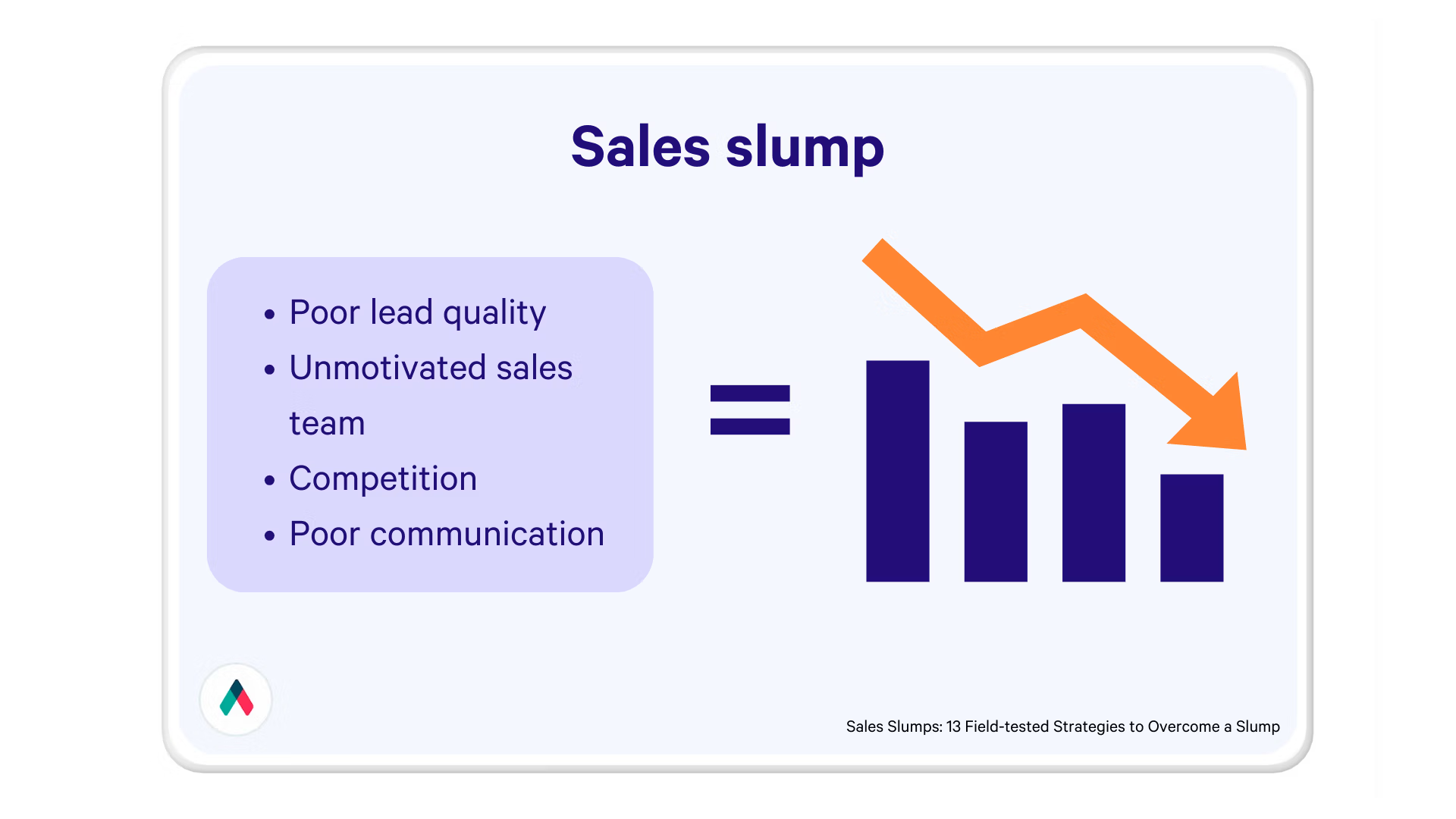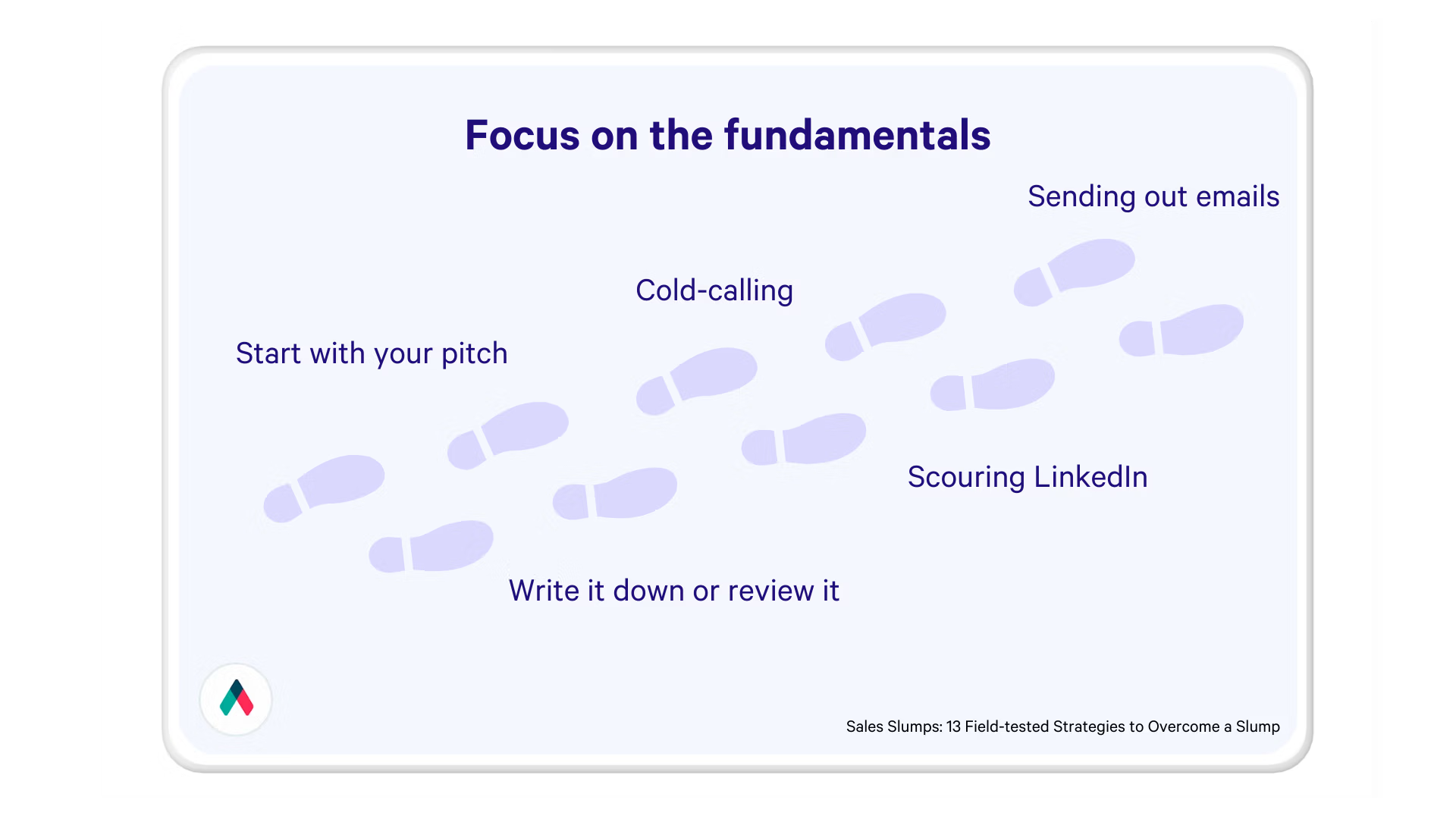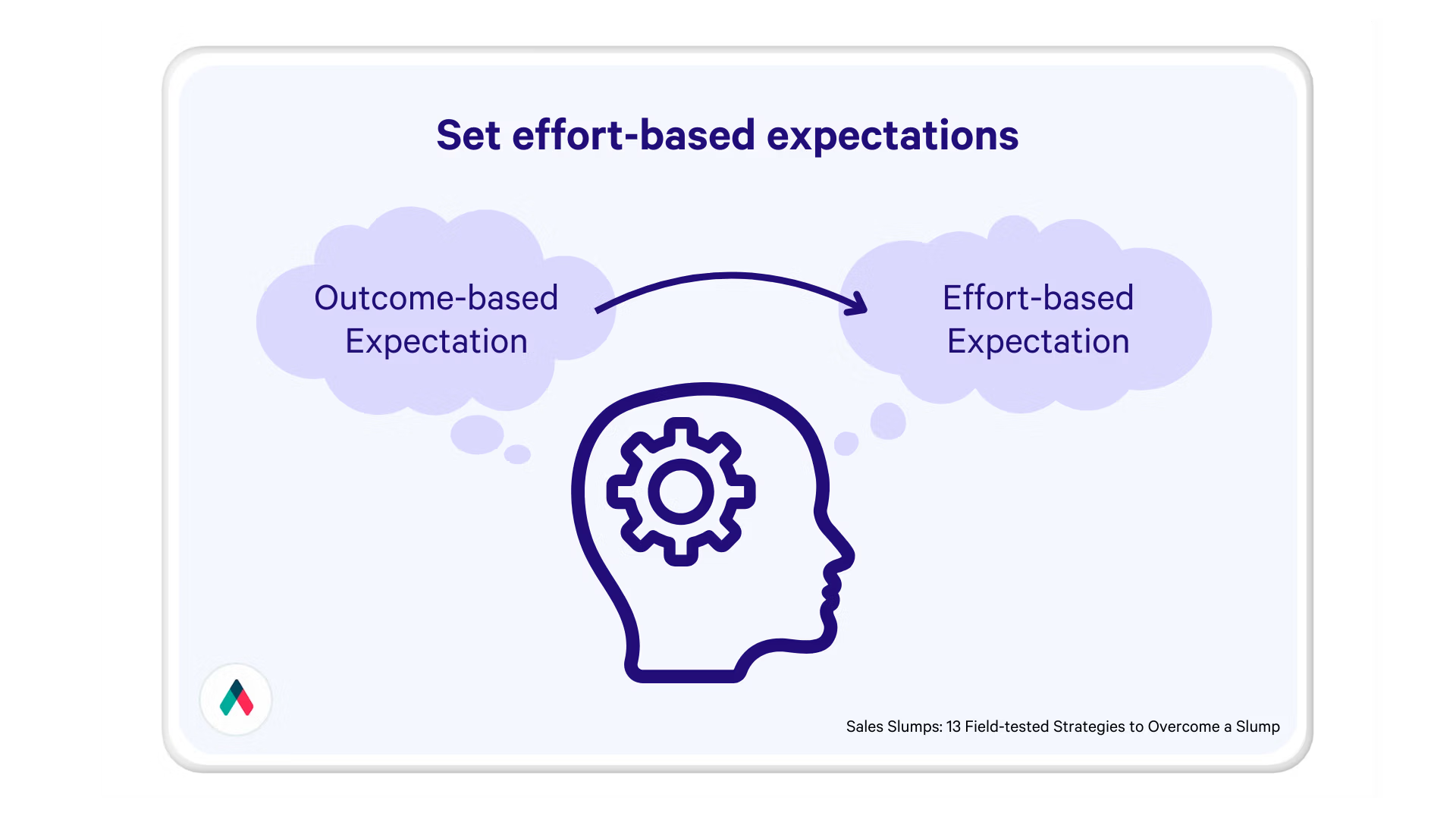We've all been there - that sinking feeling in the pit of your stomach when the once-flourishing sales pipeline turns into a barren wasteland. The exhilaration of closing deals and surpassing targets becomes a distant memory, replaced by a sales slump that seems to defy all your efforts. It's like going into battle empty-handed, without your armor on, day after day -- and it feels like it's never going to be better again.
The good news? Sales slumps can be overcome, and in this article, we'll show you 13 tactics you can use to reignite your sales mojo again.
Read on to find out more.
What is a sales slump?
In short, a sales slump is when you’ve experienced a decline in sales. This could mean that your number of leads or conversions has decreased, or something else may be going on that’s impacting your ability to close deals.
Whether you’re a beginner still in sales training or a sales leader, you need to know sales slumps are normal -- and sometimes even expected (such as during the summer holiday season). But if yours stretches on for too long, it’s important to take a slep back and identify what could be causing the dip so you can pick yourself up and resume business as usual.
What can trigger a sales slump?
There are a lot of potential causes of a sales slump, ranging from external factors like changes in the market to internal issues such as lack of motivation.
Here are some common triggers:

Poor lead quality
If your leads aren’t qualified, it’s going to be hard to close deals. It is worth mentioning that this may sometimes feel like the easiest cause to identify -- but many times, it can be a false flag. To assess if your sales slump was caused by poor lead quality, do some research and evaluate the prospects you’ve been working with.
Be 100% honest with your assessment -- it's better to uncover that the reason behind your sales slump was not lead quality, rather than make a wrong assumption and never improve.
Unmotivated sales team
Your team might be feeling burned out or just not motivated right now. It happens to the best of us, and it's somewhat part of the natural cycles of most professionals (outside of the sales world too.)
Same as with lead quality, honesty is crucial in identifying if you or your sales professionals are feeling unmotivated (or downright burned out.) That way, you can adjust accordingly and make sure you help everyone find their way back to maximum sales productivity and efficiency.
Competition
If you’re facing more competition than usual, that could be part of why your sales have dropped off. At this point, you may feel tempted to accelerate your sales processes and work double-hard to make sure more leads are converted.
However, before you kick into full gear, take a step back and assess the competition. Are they offering something unique that you don't? Is there any refining your business needs to do in the positioning department?
Once you've identified the issue, brainstorm some strategies to improve it. Not only will this help you in the short term, but such investments can also result in long-term competitive advantages, regardless of which company wins the race.
Poor communication
Communication breakdowns can lead to lost opportunities and a decrease in sales. Miscommunication (or insufficient communication) can happen within the sales team, the company, or externally (i.e., how your business communicates with customers.) Whatever it is, it's important not to throw blame, but to assess the situation with a cool head.
Once you know where the breakdown happened, please spend some time diagnosing why it happened and then brainstorm ways to fix it and avoid it in the future.
The importance of momentum in sales
Sales slumps are more than just a bad day.
They're bad days that turn into bad weeks, and sometimes months, or even quarters. And while it's normal to hit a bump in the road every now and then, recurrent and prolonged sales slumps can slow down momentum, make your team doubt their skills, and even put the company’s finances at risk.
It's important to remember that momentum is key in sales -- it is the essence of why sales teams are so successful because it fuels the entire team with optimism (and this will translate into how they interact with potential customers too.)
In essence, momentum helps you and your sales reps:
- Be more confident and self-assured
- Communicate with potential customers more effectively
- Close deals faster
- Improve customer perception of your business
- Drive more revenue for your company
Top 13 strategies for overcoming sales slumps
Hitting a sales slump doesn't have to feel like the end of the world. There are plenty of things you can do to overcome a downswing:
1. Focus on your mindset
More often than not, sales slumps start with losing a positive mindset. You have to be honest, yet positive with yourself. Reflect on your sales performance and focus on what you can do differently. This will help you assess yourself correctly and adjust those parts of your mindset that may not serve you well.
For instance, some mindset-related issues that could prevent you from performing at your best include:
- Low self-confidence and therefore, low sales confidence
- Focusing on just the numbers, and not enjoying the process
- Getting too attached to outcomes
- Lack of focus or staying too long on a single task
- Lack of measurable and attainable sales goals
- Putting too much pressure on yourself
- Low sales productivity
All of these mindset-related issues can get in the way of closing deals, but they are 100% addressable when you have a growth-oriented attitude and want to be better, as opposed to sticking to your old ways.
2. Start small
If it’s been a slow month, and numbers are low, your first instinct may be to seek out the most significant deal possible. It makes sense. Larger deals move you closer to quota faster. However, there are some flaws to that method.
First, bigger deals usually take more time. The more significant the investment from the prospect, the more likely they’ll want to trial the product, discuss it internally, and assess it thoroughly. In a study published by Databox about sales cycles, more than 30% of respondents said it takes between one and three months to close a deal, and almost 20% of them said it takes three to five months to sign a contract.
Last, bigger deals mean more pressure on you, which is likely the last thing you want when you’re in a sales slump. Sure, some folks perform well under pressure, but for others, it’s just another roadblock to overcome.
Consider going after smaller deals to start rebuilding your confidence. That could come in many different forms. For example, you could go into your CRM and review your current client list, and inquire about possible expansions. You already have a rapport with these customers, and they already know the value of your product, so that it may be a simpler sale. And if these customers aren’t ready to grow with you, consider asking them for referrals, as that’s another great way to drum up some new business.
3. Isolate the key drivers
In the midst of a sales slump, it's essential to dissect your sales funnel to identify the weakest links. This process involves a meticulous analysis of each stage – from lead generation to closing deals. By isolating key drivers, you can pinpoint where the process is faltering and implement targeted strategies for improvement.
Start by assessing your top of funnel approach – your demand generation phase:
- Are your marketing and outbound campaigns reaching your ideal customer profile?
- Are the leads reaching your sales team truly qualified?
- Are you using techniques like lead scoring to effectively prioritize your sales team's time?
Next, scrutinize the middle of the funnel – the nurturing phase.
- Are potential customers receiving consistent and valuable communication?
Finally, examine the closing phase.
- Are there obstacles preventing prospects from making the final decision?
- Are there common objections or reasons prospects are giving for not buying?
- Are there common competitors or alternative solutions you're coming up against?

Once you've mapped out your funnel and identified your problem areas, develop actionable steps to bolster them. For example, if your problem area is at the top of funnel stage, consider refining your marketing tactics or exploring new channels. Enhance the nurturing process with more personalized follow-ups or educational content. And for the closing phase, streamline the process with clearer calls to action or addressing common objections upfront.
Pro-tip: Enhancing post-discovery engagement with effective sales collateral
A significant number of deals get lost post-discovery, often due to a lack of continued engagement. To prevent this, focus on enhancing your interactions with buyers using effective sales collateral. Tools like Qwilr can be instrumental in this phase. Qwilr’s platform allows you to create compelling, interactive proposals and presentations that keep potential customers engaged and informed.
By providing visually appealing and informative sales collateral, you can maintain the momentum gained during the discovery phase. This not only helps in keeping the deal alive but also positions your offering more favorably in the minds of potential clients.
4. Get inspired
Good ideas don't work in a vacuum -- they are not born when you bend over your work and focus intensely on the task in front of you. Most good ideas happen at the most unexpected times and in the most surprising places, so keep your mind open to possibilities likely to inspire you. You might even want to take a break from the hardcore sales activities and try something more creative to get into the right headspace.
There is plenty of uplifting sales material you can watch for this. Whether from someone like Tony Robbins, Gary Vee, your favorite podcasts, YouTube videos on sales tips, or even leaders outside the sales world, it’s hard not to find inspiration.
For others, doing completely non-sales-related things can help get them inspired. Going out for a run, or hitting the gym releases endorphins, which can help inspire you. You could even blast a favorite song of yours to get pumped up.
Also, if you have a favorite sales book, you could read a chapter or two to get in the right mindset. Reading is also a great way to recharge and get some energy back, which can be helpful when you want back into the swing of things.
You could also ask to sit in on a sales call with one of your co-workers (we call them ride-along). Seeing someone else do a pitch could help spark some ideas for your next call. The other benefit is that you can do a wrap-up with your co-worker after and ask about anything in their process that stood out to you.
Remember, your team is as good a resource for feedback as any book, or inspirational video.
5. Focus on the fundamentals
If you're familiar with the NBA, you have definitely noticed a pattern: when a team is down by 10 points or more, they start shooting wild three-point shots. In some ways, it makes sense. Making a three-pointer is the fastest way to erase a deficit, in theory.
The only problem is three point shots are a lot harder to make. They seem to be the best bet, but in actuality, teams would be better served going for layups, as it’s a much higher likelihood they’ll make those. In sales, it’s not that different.
When you’re in a sales rut, just like when a team is down by a lot, it’s easy to panic and think you must go for the big shots. However, it’s probably not what will serve you best, or what you really need to get your rhythm back.

Focusing on sales fundamentals is probably the best way to accomplish that. For example, you could start with your pitch. You probably have something pretty standard, so consider writing it down and reviewing it. Maybe there are some areas you can improve or tighten up. You might even want to go back to before your slump and use some of your top sales as inspiration or case studies.
From there, try getting back to some of the basics, like cold-calling, scouring LinkedIn, or sending out emails to prospects that have idled. They may seem like elementary steps, but that’s part of their power. Even small steps in the right direction eventually lead to where you want to go.
6. Try something new
Doing the same thing and not seeing the results you're hoping for?
It might be time to change your sales strategy or your sales methodology.
Test things out; try avenues you haven't explored in the past. For example, if you’ve classically done all of your outreach through email, you could try utilizing social media to connect with potential prospects.
Data shows that top salespeople who use social channels outperform their peers who haven’t started. Also, instead of sending your message as text, you might consider doing it as a video. Having that novel element may make them more likely to interact with your message and will likely help you stand out in their mind.
There are plenty of ways you can switch things up. The main thing is just to stay open to new ideas and be willing to test them out. If something doesn’t work, move on to the next effort until you find something that does.
7. Create a clear action plan for each day
To-do lists may seem outdated and mundane, but they still have a place in our lives. After all, if they were good enough for Benjamin Franklin and Johnny Cash, why wouldn't they work for your daily tasks?
Not only will to-do lists help you ease off the anxiety of a busy day, but your brain will actually yearn for it. Adding items to a to-do list is like putting order into chaos, and ticking them off feels like finally gaining control over the situation.
At the start of each day, jot down three to five sales-related tasks you want to accomplish. The best way to stay on track is to be specific. For example, instead of writing “make calls,” you could write something like “make five calls to potential clients.” Or, you can be even more granular and create five separate tasks with each client's name and the goals for each call.
That way, you can track how much progress you’re making, and it’ll help you stay motivated. The key to sales motivation is to get started and don’t give up. You may not always get your daily to-do's done (only 41% of them do). Even so, you'll be able to make some progress and see results, which matters tremendously when you're in a sales slump.
8. Set effort-based expectations
Did you know only 53% of salespeople consistently hit quota?
As a salesperson, it’s natural to be competitive. Sales is a tough industry and requires some level of competitiveness to succeed. There are plenty of ways being competitive is an asset to a salesperson, but it can also mean having high expectations of yourself.
That’s not always a bad thing. But it's not always the best when you’re in a sales rut. One thing you can do is switch your thinking from an outcome-based expectation to an effort-based expectation.

For example, you might switch from expecting to close a certain number of deals in a week (outcome-based) to focusing on making a certain number of calls in a week (effort based). By making that adjustment, you get back in the driver’s seat and have more say over hitting those goals.
Having agency over your decisions can help boost confidence. And as we’ve already stated, confidence can help your overall performance.
9. Practice mindfulness
Meditation and mindfulness can be a complete game changer for salespeople. It may seem counterintuitive, but practicing mindfulness, even for a few moments, can help you refocus and reset to be laser-targeted in your daily efforts.
You don't have to overcomplicate this: sit still, close your eyes, take a few deep breaths, and listen to the silence. That's pretty much all there is to it. Notice your thoughts, acknowledge them, and let them go as you focus on your breath. Ten to fifteen minutes of this every day can help you stay more focused throughout the day, ease off the anxiety, and set your mind up for success (as opposed to allowing your brain to run around in circles on why leads won't convert.)
10. Run a thorough process analysis
Sometimes taking a step back can be the best way to get your sales performance on track. Take some time to analyze and review your overall process, from prospecting to closing. Note any areas that could be improved or anything you’re missing out on.
Maybe your sales process was good one or two years ago, but things might have changed over time as the market, products, and even your customers have evolved, Assess your situation, question it, and look for opportunities to improve.
11. Concentrate on helping customers
Many sales reps focus on closing deals -- and it's easy to see why that is. After all, your business goals are about hitting the numbers, getting the sales, and driving the revenue back home. But what if you could do more than that?
What about concentrating on how you can help each prospect find the best solution for their specific needs? Sometimes, thinking of the "deal" only can shift your perspective to a more transactional level, but when you focus on your customer’s needs, your relationship-building efforts are taken to another level. This is one of the cornerstones of relationship selling.
12. One foot in front of the other
We all want to do a good job. Whether it’s writer’s block, a streak of buggy code, or a sales rut, having blockers, especially internal ones, can be tough to overcome. Though it may be difficult to do, it’s not impossible.
The best thing you can do is control what you can and try not to worry about what you can’t. If you can do that and stay motivated, you’ll be able to overcome any bad season. Be kind to yourself, remember the fundamentals, get creative, and keep trying.
If you do, you will be over your patch of “bad luck” in no time -- and next time you hit a similar downside, you'll know how to "attack" it.
13. Ask for help when you need it
If you’re really stuck in a sales slump, don't try to power through by yourself. Talk to your sales manager or a mentor for guidance. There's zero shame in asking for help, and you'll be surprised how many people are willing to lend a hand. It's better to stand up and talk about the issues you've been facing than mute them down -- talking might help you find solutions, but bottling them up won't do you (or your company) any good.
Turn your sales slump into your fuel for sales success
There are very few positives about sales slumps: they are energy-consuming, shoot right through your self-confidence, put your sales activities on a seemingly endless bad path, and can make you feel like a complete failure. But if you take the right approach, it can become your most significant catalyst to success
Instead of letting your sales slump burry you in an ocean of worries and anxieties, let the lessons you're learning skyrocket you to the best version of your sales self.
About the author

Brendan Connaughton|Head of Growth Marketing
Brendan heads up growth marketing and demand generation at Qwilr, overseeing performance marketing, SEO, and lifecycle initiatives. Brendan has been instrumental in developing go-to-market functions for a number of high-growth startups and challenger brands.
FAQs
Many things can cause a sales slump, including changes in the market, new competitors, poor communication, outdated sales practices, not having the best sales tools at disposal and a negative mindset.
Analyzing past sales is crucial. It reveals patterns and guides improvements. Understand what worked, learn from what didn’t, and use these insights to refine your approach.
Start by assessing your current strategies and customer feedback. Look for shifts in market trends that might affect your performance. Focus on maintaining a positive mindset and consider fine-tuning your communication methods for better engagement. Quick self-reflection can be a crucial first step in reversing a sales slump.
Revisit your sales basics and consider new strategies. Adjust your pitch, explore different engagement channels, and listen closely to customer feedback. Flexibility and a positive attitude are key to navigating through the slump.
To stay positive during a sales slump, focus on cultivating a positive mindset. Seek inspiration, try new things, go back to the basics, or even take a break and return to it when you have more energy.
If you’re really struggling to pull yourself out of a sales slump, seek help from your sales leader, a mentor, a trusted friend, or even a trained mental health professional.


